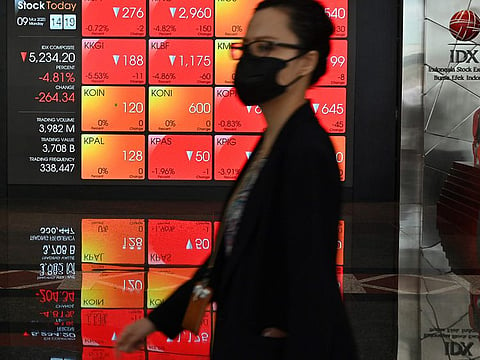Covid-19 omicron variant: Markets flop as travel curbs go global
Global equities dropped, with S&P 500 posting its biggest one-day slide since Feb

Also In This Package
COVID-19: Philippines suspends flights from 7 countries

UAE suspends inbound flights from 7 countries

Canada restricts travel from 7 African countries

US suspends inbound flights from 8 African countries

The World Health Organisation and the European Centre for Disease Prevention and Control said a new strain discovered by South African researchers is a “variant of concern” as global markets swooned at the prospect of a setback in the fight against the coronavirus.
Governments from the US to Hong Kong tightened restrictions on travel from countries in southern Africa after the discovery of the new mutation. South Africa called the travel bans “unjustified”, while former FDA commissioner Scott Gottlieb said the measures were counterproductive.
Scientists are trying to ascertain how quickly the new variant, officially assigned the Greek letter omicron, can spread and whether it’s resistant to Covid-19 vaccines. The EU’s health agency suggested that vaccines may not work well against the mutation, while Moderna said it’s already conducting clinical studies of two multivalent booster candidates.
Global equities dropped, with the S&P 500 posting its biggest one-day slide since February and travel stocks among the biggest decliners. Commodities from copper to crude oil fell, while US Treasuries and the yen strengthened on haven demand.
Australia to announce new curbs
The Australian government will announce new precautionary measures in response to the emergence of the omicron strain, the Sydney Morning Herald and Age newspapers report, citing unidentified sources.
Measures are likely to include quarantine or isolation for Australians returning from southern Africa, according to the newspapers. There are currently no direct flights between South Africa and Australia.
On Saturday, New South Wales and Victoria states respectively reported 235 and 1,252 new cases.
Delta has no plans to change South Africa service
Delta Air Lines Inc. will continue to operate flights between the US and South Africa after the Biden administration imposed fresh travel restrictions on the country and several neighboring ones.
The carrier operates three flights per week between its Atlanta hub and Johannesburg. “There are no planned adjustments to service at this time,” the carrier said in an emailed statement.
ECDC concerned vaccines may not work well
Based on omicron’s mutation profile, partial immune escape is likely, the European Centre for Disease Prevention and Control said in a threat assessment report on Friday.
The EU’s health agency is among the first official authorities to acknowledge that vaccines may not work well against the new strain.
“The omicron variant is the most divergent variant that has been detected in significant numbers during the pandemic so far, which raises concerns that it may be associated with increased transmissibility, significant reduction in vaccine effectiveness and increased risk for reinfections,” the ECDC said.
The ECDC pushed authorities to “urgently” reinforce pandemic restrictions, avoiding travel to affected areas, and the vaccination of holdouts. “Countries should consider a booster dose for those 40 years of age and over, first targeting the most vulnerable and the elderly and could then consider a booster dose for all adults 18 years and older at least six months after completion of the primary series.”
WTO postpones Geneva ministerial meeting
The World Trade Organisation postponed its in-person ministerial conference in Geneva as Switzerland tightened travel restrictions, people familiar with the situation said.
The conference will be convened as soon as conditions allow, they said.
Gottlieb calls travel curbs counterproductive
Scott Gottlieb, a former FDA commissioner, took to Twitter to express his disapproval of the travel restrictions being imposed due to the latest variant, saying they hurt current containment efforts and discourage future sharing.
US, Canada curb travel from southern Africa
President Joe Biden’s administration will restrict travel from South Africa and seven other countries starting on Monday, according to senior administration officials. In addition to South Africa, they include Botswana, Zimbabwe, Namibia, Lesotho, Eswatini, Mozambique and Malawi.
The policy doesn’t apply to American citizens and lawful permanent residents, though they must still test negative prior to travel to the U.S.
Canada is banning the entry of foreign nationals who have traveled through southern Africa in the last 14 days. We are “acting quickly to protect the health and safety of Canadians,” Health Minister Jean-Yves Duclos told reporters in Ottawa.
Netherlands tightens curbs
The Dutch government will force bars and restaurants to close in the evening for the next three weeks, seeking to cap a surge in infections that’s heaped pressure on the nation’s battered health system.
The country will enter an evening lockdown, with non-essential sites from cinemas to gyms shutting down at 5pm each day from Sunday. Supermarkets will close from 8pm, and schools will be unaffected.
WHO says B.1.1.529 is variant of concern
The WHO has designated B.1.1.529 as a variant of concern, posing a threat that could confound countries’ efforts to slow the spread of Covid-19, according to a web statement. The WHO assigned the Greek letter omicron to the variant.
The variant “has been detected at faster rates than previous surges in infection, suggesting that this variant may have a growth advantage,” the WHO said.
Vaccine makers study variant’s impact
AstraZeneca says it’s investigating the impact of new Covid variant on the vaccine developed with University of Oxford, with studies under way in Botswana and Eswatini.
The company is testing antibody treatment against new variant, and says it’s hopeful of efficacy due to “potent antibodies with different and complementary activities against the virus”.
Johnson & Johnson, maker of a one-dose Covid shot, is already testing its vaccine against B.1.1.529, CNBC reported, citing the company.
BioNTech said earlier it expects the first data within two weeks of how the strain interacts with the vaccine it makes with Pfizer.
Sign up for the Daily Briefing
Get the latest news and updates straight to your inbox






